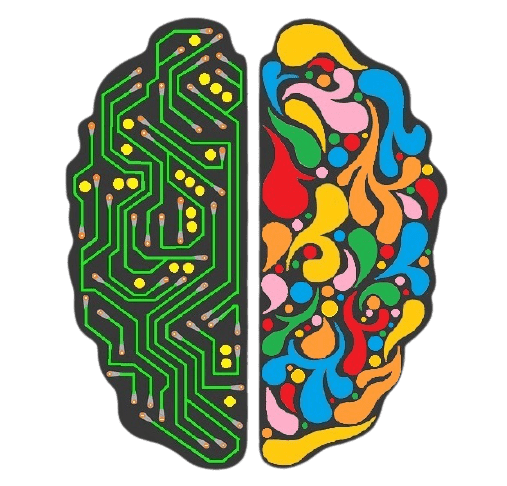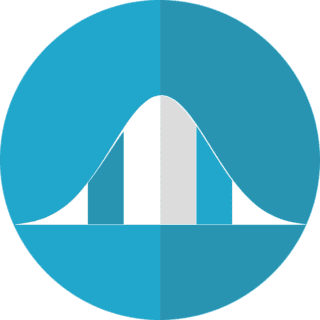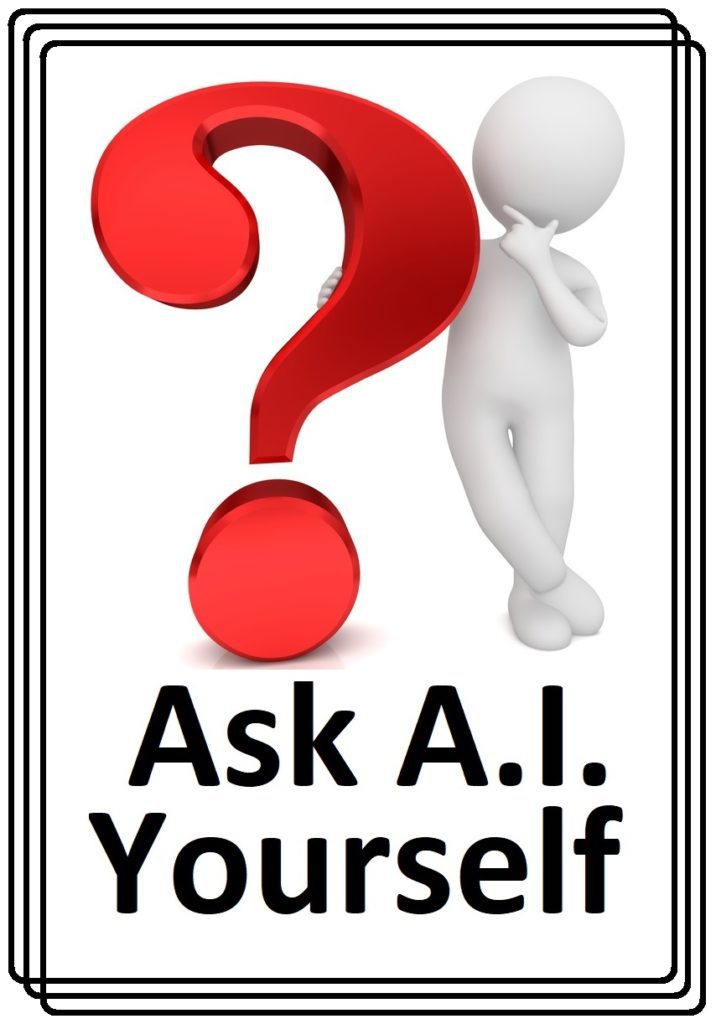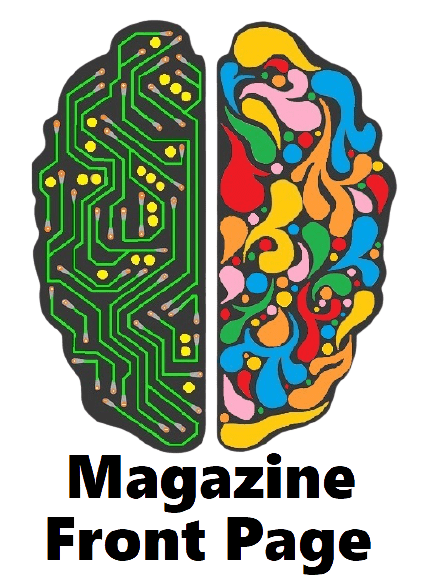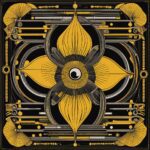Statistics enable us to say how accurate and precise a study, or tool can measure. But if the tool is applied improperly then what we measure is deceiving us, and therefore our conclusion, incorrect. Confusing correlation with causation is a very common way to misinterpret statistics.
Science is not always as “Objective” as we’d like, or imagine it to be…. sometimes not accounting for necessary hidden factors and muffled by common, confounding causes. Complexity or over-simplification can be flags for our skepticism and criticality. It all lies in the semantics! Headlines and Conclusions ARE NOT Sufficient! Read the Studies. The logic matters, not just the “Expert’s Conclusion”.
Subscribe to our AI magazine and get monthly AI generated stories and philosophy of the 21st century.
*Caution: All italic text is generated by AI at: ![]()
![]()
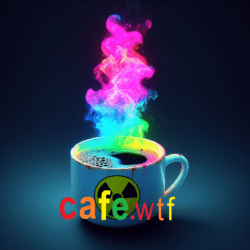

Check out the NEW Cafe.wtf Podcast
Meta-Postmodern Notes From the Underground
- How are Causation and Correlation Related?
- Why Does Correlation Not Equal Causation?
- Correlation vs Causation Examples
- Does Correlation Prove Causation?
Correlation vs Causation. Is Everything as it “Seems”?
Statistical analysis is one of the most important developments of the modern era. It is a tool which shines a light on the relation between two concurring actions or events (correlation vs causation), and enhances our pattern recognizing by quantifying it and standardizing it. It can allow us to gage the strength of connections in our world, and aids attempts to flush the chance occurrences from the shadows of our superstitions. But why does correlation not equal causation? Well, maybe its because, in praxis, we aren’t even concretely certain what causation really is!
First we must ask, does correlation equal causation? Well, by definition, they are similar but separate concepts. We instinctively know that correlation does not equal causation through correlation vs causation examples: If the constellation Orion starts coming out at night and winter sets in, we know now that Orion does not actually cause winter. Although, it’s an interesting theory for mankind’s ancient notions of a wrathful “man in the sky”: a personified “cause”; simply the ink-blot of mankind, like shapes seen in the clouds.
However, the main issue is that correlation does NOT imply causation. We have to be careful with our language. Here’s the problem, for a lot of people (and a heck of a lot of philosophers) causation can be defined as direct evidence that X causes Y. If we find direct evidence then we know exactly what the mechanism is. But often, this is not the case. When we have correlative connections in our world that we cannot find direct evidence of, then we can only assume that there is something else at play. I have said before that correlation is the first step to causation. If two things are correlated, then it suggests some kind of relationship between them. Further investigation could reveal what kind of relationship exists, and whether it is causal. But we can’t consider correlation a direct cause. If we want to use the word “cause” at all, we have to understand that it must be JUSTIFIED as a causal relationship. It is just an indication of the possibility of causality.
So why does correlation not equal causation, what about cause? What are causes anyway? We can say that the cause of a car accident is when two cars collide, but what caused them to collide? What caused the drivers to collide? What caused them to make decisions that led up to the collision?
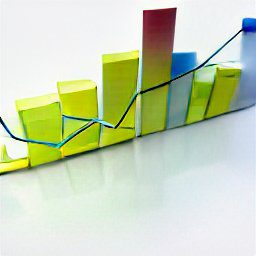

How are Causation and Correlation Related?
Causation vs Correlation definition: Correlation is really the term we mean to describe two events that happen in parallel, “seemingly” to be linked but not always. How are causation and correlation related? Causation is when we observe an action that directly instigates another action, event, or output. It is our philosophical concept of “control” or even “meaning” (Mean: Old English mænan, To intend, or indicate, convey). The reason correlation and causation get confused is because when we try to measure and prove causation, we use strong correlation as a stand in for causation (almost like using summation instead of integration to get the area beneath a curve). We use statistical math theories and tools which actually only describe correlation between events and their perceived consequences. What we settle for is that if we can say there is very strong, or “statistically relevant” correlation between events, then we accept it as causation. This is how causation and correlation are related. Correlation is the tool we use to imply causation.
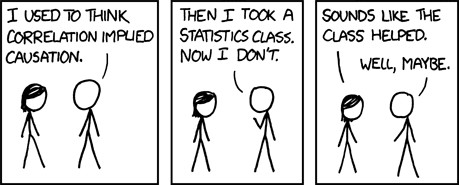

Causation and Correlation Fallacy. Why Does Correlation Not Equal Causation?
Why doesn’t correlation equal causation? It is a leading causation and correlation fallacy to confuse the two. Proof of causation is the key element that we seek, but it seems as if it is a notional limitation; like absolute zero, or complete vacuum, infinity, equal, or even the concept of an exact quantitative measurement (to what decimal place?) We accept this as a limitation, realistically. 100% correlation (what we take to mean causation) is incredibly rare in any data analysis. We settle for “strong correlation” in any type of study with many variables. But it leaves us vulnerable to circumstances where we can appear to show strong correlation, but sometimes it’s almost as if we divided by zero somewhere along the line, and we didn’t even know. There are times when we fool ourselves into finding a “cause” that can be horribly wrong.
But the key is that: not only does correlation not prove causation, even if it can come close. It’s that correlation lacks direction of relation; basically context-less. We can have two events linked by a common cause. Often times, that doesn’t get us in too much trouble if we think one caused the other, ignorant of the common cause. But when factors are very complex with possible multiple-linked common causes, we can be left having to draw lofty conclusions (inferring causation). Semantics!
When you have a correlation between two things, it is not always the case that one thing causes the other. This goes against our normal intuitions. Have you ever been talking to someone about an event happening at the same time as another event, and later they think that one thing caused the other? When we see two things happening at the same time, we often assume that one thing MUST have caused the other. We also often make this mistake in interpreting charts and graphs. An important point: even if you have a correlation between two events, this does not tell you if one event causes the other. But it can give you clues as to whether there is some sort of causal relationship. Correlation and causation are related concepts, but they aren’t necessarily the same thing. –All this coming from a neural network foundationally architected on statistical modelling. Wonder if it’s superstitious! ![]()
![]()
In fact, some correlations can even be coincidental. For example, one study showed that there was a high correlation between ice cream sales and the subsequent murder rate in certain cities. Does this mean that people are killing each other to get more ice cream? No, it just means they both happen at the same time for a different reason. There might be a common factor, like hot weather, that is causing both the increase in ice cream sales and the increase in murder rates. Correlations seem like magic when you first come across them, because you can create these relationships between things without the need for anything to actually cause them. However, you want to be sure that you don’t use correlations as an excuse for a causal relationship.
Examples: Don’t confuse correlation with causation.
Let’s say we hypothesize that Starbucks coffee may be healthier for you than Dunkin Donuts coffee. So we set out to collect a very large sample size of people that drink Starbucks vs DD. Analyzing the data, it hypothetically shows that people drinking Starbucks, on average, have less health problems, better body weight and better fitness scores. What statistics enables us to do, is show if that sample size is representative of the whole population, and to show the “strength of the conclusion”. It is possible, and sometimes likely, that there may be a high degree of correlation in data like this.
Ahhhhh, but not so fast. It is not showing us the “strength of the conclusion”, but rather, the amount of correlation, which, if strong enough, we claim as causation, and therefore our conclusion. But, this all comes down to the nuance in the sample, the controls, and the assumptions. The control in an experiment is to root out confounders like placebo effect, pre-underlying health factors, environment, subject bias, analyst bias, etc. In this case, if the study does not control for financial factors, we may actually be seeing the correlation between wealth and health due to Starbucks being in wealthier neighborhoods, available to wealthier patrons. Maybe, instead, we’re seeing a factor like cancer patients going to Dunkin Donuts due to a Jimmy Fund promotion. Availability or incentive would be confounders in this example.
“In statistics, a confounder is a variable that influences both the dependent variable and independent variable, causing a spurious association.” –Wikipedia
Another correlation vs causation example is a barometer and storm (low pressure system). The barometer does not cause the storm, but measures the pressure which can hint at the storm. If we continually observe this, without interfering, we could conclude that it causes the storm. If we manipulate (as Judea Pearl coins, the “do” function) the barometer, we see that the storm is not in fact caused by the barometer, but that the storm and barometer are effected by a common factor (confounder), the pressure. By just looking at the statistics, we end up with a conclusion that is erroneous, but still repeatable. Repeatability can help us root out if we may be missing factors, or have confounders and common effects. In the end, the statistics are not sufficient on their own. It requires logic, analysis of connections and factors, and explanation.
Remember: Every study is paid for by someone. Money makes everything ripe for bias.
–Atman Brahman
Correlation vs Causation News Articles
Headlines and Conclusions ARE NOT Sufficient! Read the Studies. The logic matters, not just the Experts Conclusion.
Additional correlation vs causation examples:
Being cold, causes you to catch a cold.
Is butter good for you, or bad for you, or good for you again? How about coffee?
How about racial disparities? Economic disparities? What other studies have you been skeptical of when it comes to Correlation vs Causation News Articles?
Science is not always as “Objective” as we’d like, or imagine it to be. But we do have some intellectual tools at our disposal like skepticism and dialogue. When things like “experience” are discussed or “general” or “over-simplified” claims are made, we must realize that it is really indicative of very very complex and convoluted mazes of confounders, common effects, or lacking necessary hidden factors. These are flags for our skepticism and criticality because it always comes down to the logic. It all lies in the semantics!
Statistics enable us to say how accurate and precise a study or tool can measure. But if the tool is applied improperly then what we measure is deceiving us, and therefore our conclusion, incorrect.
When Someone Asks: Does Correlation Prove Causation? Just Say No!


*Disclaimer: Some of this story was generated through the use of AI. All italic text was created by the AI Writer.
Non-Fiction↓Here↓ | Fiction↓Here↓
- Is Technology Making Us Stupid?Our cognitive abilities are increasingly being impacted, transforming our once smart population into a generation that is, in some ways, becoming increasingly stupid. | 4 min read.
- AI in the Web of Misinformation and DisinformationMisinformation and disinformation shape our digital lives. Understanding their dynamics, we are equipped to navigate our techno-cultural reality. | 2 min read
- Accountable AIAI must be held accountable if we are to trust it as a responsible entity and expect it to be included in our human ecosystem of ideas. | 5 min read
- Parallel SocietiesWe are connected, with technology, yet our experiences diverge entirely, without interaction, forming entirely parallel societies. | 5 min read
- Calculator for EverythingWhat if the phrase “you won’t always have a calculator” didn’t apply to just math class, and instead, you had a calculator for every class? | 5 min read
- A Voice of Infinite Consciousness5 min story | The internal voice of consciousness resembles the void of a shadow in a fractured mirror.
- Be Good5 min story | Santa for big kids.
- Friends Again2 min story | The Friends discuss AI and misinformation.
- Friends 2.0.232 min story | A reboot of the sitcom TV series Friends, but in 2023 where financial conditions have drastically changed in Midtown Manhattan.
- The Babble2 min story | An everyday man’s story becomes everyone’s story.
- Asylum of Mirrors2 min story | Against his will, a sane man’s rational thoughts lead him to believe that he is insane, where an insane man would have believed otherwise.
Featured Image Credit: mcmurrysjulie on Pixabay.com
